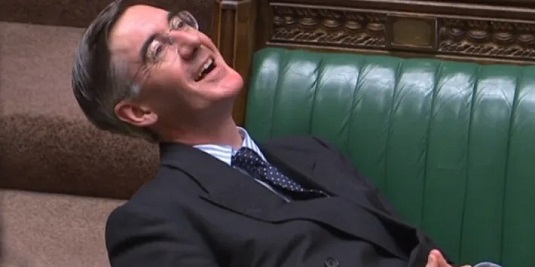
Under the cloak of democratic accountability, the Leader of the House believes parliament's functions can only be discharged properly if honourable members are there in person to challenge the government. After some pressure, he put forward a motion that would allow MPs to ask urgent questions and make statements remotely but rule out electronic voting. The result? An easy win for the government's plans to open parliament by 261 to 163 votes, but not before the absurdity of over 400 MPs standing in a socially distanced queue snaking its way around the estate. The vote took 36 minutes and, again, made a mockery of the so-called mother of parliaments. Obviously a stupid scheme, plenty of MPs have talked about their unhappiness. Tory MP Robert Halfon on BBC Breakfast Tuesday morning said Rees-Mogg was uninterested in his own difficulties - he's presently shielding due to underlying health conditions. Margaret Hodge has complained for the same reasons, and Valerie Vaz has criticised the plans for being discriminatory. You have to ask why the government are so wedded to this absurdity.
We know accountability is poppycock. If Boris Johnson took it at all seriously he wouldn't dive out of Downing Street Covid updates at every given opportunity. Nevertheless while this is farcical for everyone concerned, with potentially deadly consequences for some MPs, there are real political logics behind the move. Moves that will advantage the government.
The first is keeping up appearances. With MPs spread about the chamber, Johnson looks isolated and all at sea when he addresses the assembled. Even though Keir Starmer's questioning is quite restrained the Prime Minister has had trouble coming up with convincing answers. With most workers still at home and more watching PMQs than usual, Rees-Mogg knows having his boss floundering without the encouragement of his satraps, the look is not a good one. To enhance the optics, as they say, the government are happy to risk the health of hundreds of others. Well, it's all of a piece.
Then we have the issue of authority. The standing of the government has come under strain of late thanks to the Cummings affair, opposition to easing the lockdown, and U-turns on NHS charges. There was also a mounting rebellion of MPs against Johnson's refusal to let Cummings go. Picking a fight to enforce something petty, pointless and going against all reason is a useful reminder of who is in charge. It won't do anything to restore the government's good fortune, but a quick Commons win will assure some jittery supporters worried it's all starting to run away from them.
And then we have the main reason, at least where Rees-Mogg is concerned. The move to remote sitting and electronic voting is something of a Trojan Horse. Not because he's fondly attached to parliament's absurdities and mind-boggling traditions, though he's more than happy to cultivate the country gentleman fondly attached to custom and ancient ritual. This is all about power. The convenience of something as basic as push button voting would speed up proceedings, meaning more time for debate and a pressure for more private members' bills - plenty of which are never to any government's liking, and has potential to put it in difficult positions. But more than that it's the thin end of a wedge. If electronic voting, where might the change-minded end? Sittings at reasonable hours? More powers for back benchers and select committees? Electoral reform? Someone as hyper class conscious as Rees-Mogg wants to preserve parliament as is because it is a bastion of class privilege. The stupidity has the consequence of framing British democracy and its constitution, such as it is, a strange and alienating beast. The building and its rituals affects the private school/Oxbridge atmos, a home from home for generations of bourgeois politicians. The accent on tradition comes before democracy, underlying the political habitus of the British ruling class. It's almost as if representatives of the popular will are unwelcome in the corridors of power and everything about the House contrives to remind MPs of this. Naturally, some find this charming and others the pinnacle of democracy. Labour MPs in particular are prone to this parliamentary cretinism. Tories, especially so Tories from bourgeois backgrounds, aren't stupid enough to fall for these transparently obvious illusions. Nevertheless, Rees-Mogg understands the smallest of changes challenges the established way of doing things, and with it comes a host of unforeseen dangers - as the Tories have found out with their two recent experiments with referenda. Keeping the arcane traditions going throws chains of procedure and pomp around the dangers of the democratic impulse and harnesses it to innocuous and often useless ends.
The government then have had their way on this, but again they are storing up trouble. 24 MPs in the current parliament are 70 or over, 11 of whom are Tories. And of those who shielding, we are talking dozens from all parties. By bulldozing its way through opposition in the Tory ranks, Johnson and Rees-Moog are sowing the seeds of ill will. We saw how that undid Thatcher in the long-run and more recently, Theresa May following her imperial phase where she rode roughshod over dissenting voices. Could we yet see a case of history repeating?
Image Credit
Rees Mogg is one of those awful caricature Tories you get from time to time. Shows the reactionary nature of that party.
ReplyDelete!0 Tories rebelled against the whip on this vote. Steve Baker was certainly one of them, but we await details of the other nine.
ReplyDeleteit is annoying, as a Tory, when my lot do stupid things like this. Gives you lot a chance to wheel out nonsensical articles like this one.
ReplyDeleteRees Mogg is not going to be a Tory Leader. Or, more accurately, both he and the country would have to change quite a lot before that happened. But whatever, just bang away flogging dead horses.